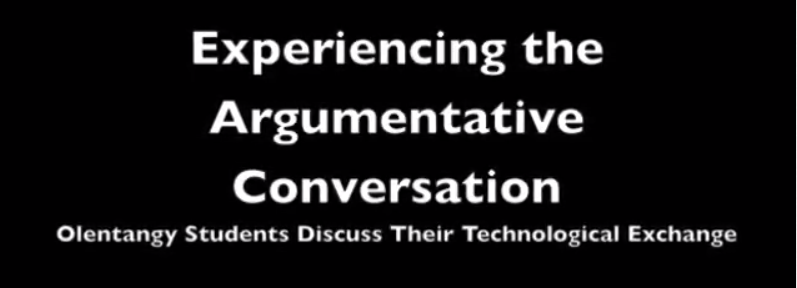Digital Learning Partnerships: Transforming the Way Students—and Teachers—Think about 21st-Century Learning
0September 15, 2012 by Tom McKenna

http://www.youtube.com/watch?v=aERxhVyfbFc
—by Chris Moore, Olentangy Liberty High School, and Andrea Dodge Vescelius, Olentangy Orange High School.
Andrea Dodge Vescelius and Chris Moore (BL ’12) have turned their Bread Loaf Teacher Network (BLTN) collaborative projects into a year-round endeavor in collaborative scholarship. They are members of a network that has at its core the tenets of the Bread Loaf School of English: the intensive study of literature, culture, pedagogy, and literacy. Both teach in Olentangy local schools, outside of Columbus, Ohio—Chris at Liberty High School and Andrea at Orange High School. They have been collaborating for five years. This article chronicles one of their recent projects, a cross-classroom dialogue about argumentation.
Action research that includes students and teachers as co-researchers, giving them an opportunity to reflect upon and analyze their work, is a BLTN tradition that reflects the belief that teachers and students are essential sources of knowledge about community issues, language, and learning, and are thus primary agents of change. During this spring, seniors in our two sections of AP Language and Composition participated in a second annual argumentative writing partnership. Last spring’s chapter in our multi-year collaboration is yielding rich rewards for us as teachers and researchers, for our students, and—we hope—for all who are interested in networked digital teaching and learning. In an end-of-year conversation with our students, we found that the experience led students, and us, to important insights in media literacy, an urgently needed skill for all students and teachers. We were also reminded of how our students value the social construction of knowledge.
A Polite Conversation about Argument
Each of us spent the third quarter teaching the basics of argumentation (kinds of and occasions for argument, Toulmin structure, audience appeals, raising/responding to the counterargument, logical fallacies, etc.). Students in both classrooms then read and studied arguments detailing the positive and negative impacts that the Internet is having on cognitive processes and critical thinking abilities. The readings included such things as Nicholas Carr’s seminal 2008 essay, “Is Google Making Us Stupid?” as well as Jamais Cascio’s rebuttal to Carr, “Get Smarter.” We also assigned another rebuttal to Carr: Sharon Gaudin’s “If You’re Stupid, It’s Not Google’s Fault.” Using Schoology—an interactive, user-friendly website created for K-12 classrooms—students next engaged in online conversations about ideas, concepts, and strategies presented in the arguments.
About 90 students participated in the Schoology dialogue. Even though students were in the same district, they didn’t know each other. This dynamic created a real-world rhetorical element that is often missing in classroom writing: an authentic but unknown audience. Students later commented that this added dimension caused them to set the bar exceptionally high for their first experience participating in online discussions. We briefly reviewed online etiquette in our classrooms, but students understood from the start that this was to be an academic endeavor in which their credibility and respect would need to be earned through the insights contained in their contributions.
Students and Teachers at the Research Table: Analyzing the Impacts with Our Students
As teachers, we both observed that the high quality of students’ analyses of their readings and the higher level of students’ engagement with their audience were powerful evidence that collaboration across classrooms had a positive effect on students’ critical reading skills and writing development. Moreover, when we deliberately involved our students in evaluating the collaboration, their insights further sharpened our own understanding of the learning that took place in the exchange. For example, at the end of the school year, we selected 4-5 students from each high school to join us to form an action research team of students and teachers taking a close look at the writing that had been produced in the Schoology discussion. Chris filmed the conversation, whose highlights are collected in the video included here. We distributed excerpts from the online discourse to each person, and students were asked to identify evidence of strong argumentation in it. Students then discussed how their experience in the online exchange had influenced their learning and thinking. The meeting lasted for several hours; students articulated nuanced insights about learning, about argumentation, and about themselves that amazed and enlightened us, adding a dimension to the project that will certainly inform our goals for future work along these lines. It was great to see students—who had previously shared such a rich online experience together—meet in person. The social aspect of online collaboration, i.e., writing for a real audience of peers about vital issues, turned out to be an important part of the enjoyment of the experience, an integral part of the learning process, and a catalyst for the demonstration of surprisingly advanced writing skills.
Category Archives, BLTN Teachers, Fall-Winter 2012 | Tags:
Leave a Reply